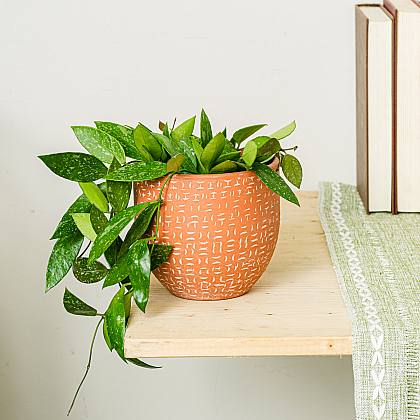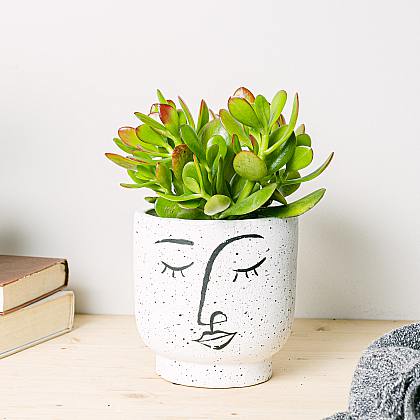Decorate your office with the best plants without worrying about their maintenance
Are you looking for ways to bring life and personality to your office without investing a lot of time and effort? A great option is to decorate your workspace with low-maintenance plants
Are you looking for ways to bring life and personality to your office without investing a lot of time and effort? A great option is to decorate your workspace with low-maintenance plants. In this article, we'll explore the benefits of having plants in the office, give you tips on how to choose the right plants, and how to care for them without spending a lot of time on them. We'll also discuss the difference between artificial and natural plants, and come up with some creative ideas for incorporating them into your workspace. Find out how to enjoy a healthier, more productive environment with plants in your office.
Benefits of Having Plants in the Office
Having plants in the office can be beneficial in a number of ways. First, plants can help purify the air, which means they can reduce pollutant levels and increase air quality in the office. In addition, plants can help reduce stress and improve employee morale. The presence of plants in the office can create a more relaxed and pleasant environment, which can have a positive impact on workers' productivity and creativity. It has also been shown that plants can help reduce ambient noise in the office, which can be beneficial for those who work in noisy environments. Another advantage of having plants in the office is that they can be an effective way to decorate the space and make it more visually appealing. Plants can add color and texture to the décor, which can enhance the overall aesthetics of the workspace. In short, having plants in the office can be beneficial for the health and well-being of employees, as well as the aesthetics of the workspace.
The Best Plants to Decorate Your Workspace
Plants are a great choice for decorating any workspace, as in addition to providing a pleasant and welcoming environment, they can also improve air quality and increase productivity. However, not all plants are suitable for a work environment, as some may require a lot of maintenance or be toxic to people or pets. Among the best plant options to decorate your workspace are sansevieria, also known as mother-in-law's tongue, which is very hardy and can survive with little light and water; the cactus, which requires very little maintenance and is perfect for smaller spaces; and Poto, a climbing plant that adapts well to shade and can improve indoor air quality. Other recommended plants include philodendron, lucky bamboo, and aloe vera. It's important to choose plants that adapt to the lighting and temperature conditions of your office, as well as consider if there are allergy sufferers or pets in the place. In addition, before purchasing a plant, it is important to research its specific care and requirements to ensure that you can provide it with the right care. All in all, choosing the right plants to decorate your workspace can make a big difference in terms of the aesthetics of the place and also in terms of the health and well-being of those who work there.
How to Choose the Right Plants for Your Office
When choosing the right plants to decorate your office, it's important to consider certain factors to ensure that they will adapt well to that environment. First, consider the amount of natural light coming into your workspace. If you have an office with a lot of sunlight, you can opt for plants that need more light, such as cacti or succulents. On the other hand, if your office has little natural light, it's advisable to choose plants that can survive in low-light conditions, such as ferns or hardy houseplants.
Another aspect to consider is the size of your workspace. If you have a small office, it's best to opt for smaller or hanging plants, such as spider plants or bromeliads. This way, they won't take up much space and you can enjoy their beauty without feeling weighed down by clutter.
In addition, you should take into account the level of maintenance you are willing to dedicate to your plants. If you don't have a lot of time to take care of them, it's a good idea to choose low-maintenance plants, such as pothos or peace lilies. These plants are hardy and require little watering and attention.
In short, when choosing the right plants for your office, you should consider the amount of natural light available, the size of your workspace, and the level of maintenance you're willing to provide them. By taking these factors into account, you'll be able to select the perfect plants to create a pleasant and productive environment in your workplace.
How to Care for Plants Without Spending a Lot of Time
Taking care of plants in the office doesn't have to be a time-consuming and effort-intensive task. There are different strategies you can implement to ensure your plants stay healthy with a minimum of attention. First, it's important to choose low-maintenance plants that are suitable for your work environment. Some popular choices include the snake plant, peace lily, and jade plant, all of which are known for their hardiness and ability to survive in less than ideal conditions. In addition, it is essential to establish a regular but moderate watering routine, avoiding both over- and underwatering. A useful trick is to place the pots on trays with stones and water to increase the humidity around the plants. It's also important to make sure plants get enough natural light, by placing them near windows or using artificial lights if the space is dark. Finally, you can use slow-release fertilizers to provide nutrients to your plants without having to do it frequently. By following these simple tips, you'll be able to enjoy the beauty and benefits of plants in your office without having to invest too much time in caring for them.
Artificial Plants vs. Artificial Plants Natural Plants: Which Is the Best Option?
Artificial Plants vs. Artificial Plants Natural Plants: Which Is the Best Option?
When it comes to decorating your office with plants, the question arises as to whether it is better to opt for artificial plants or natural plants. Both options have their advantages and disadvantages, so the choice will depend on your preferences and needs.
Artificial plants are a popular alternative due to their low maintenance. They don't require watering, sunlight, or special care, making them an ideal choice for those who don't have time to devote to plant care. Plus, they're durable and don't need to be replaced often.
On the other hand, natural plants offer additional benefits. Not only do they add beauty and life to your workspace, but they also help purify the air, reducing the presence of toxins and increasing oxygen levels. Studies have shown that having natural plants in the office can improve air quality and reduce stress, resulting in a healthier, more productive environment.
However, caring for natural plants may require a little more time and effort. It's important to choose the right plants for your office that adapt to the lighting conditions and temperature of the space. In addition, they will need to be watered regularly and receive indirect sunlight to stay healthy.
Ultimately, the choice between artificial plants and natural plants will depend on your personal preferences and the time you are willing to invest in their care. If you're looking for a practical, low-maintenance option, artificial plants may be the best option. However, if you value the health benefits and are willing to put in the time to care for plants, natural plants will be your ideal choice.
Creative Ideas for Incorporating Plants into Your Workspace
There are many creative ways to incorporate plants into your workspace. One option is to hang pots on the wall or ceiling, which saves desk space. You can also use shelves to place several plants together and create a small vertical garden. If you don't have a lot of space, a practical solution is to use hanging plants, which can be placed on top of shelves or in the corner of your office. Another creative idea is to use aromatic plants such as lavender or rosemary to add a touch of freshness and aroma to your workspace. Additionally, succulent plants are a good choice for those who don't have time to care for them on a daily basis, as they require very little water and sunlight. You can also play with the containers and pots, choosing different sizes, shapes and colors to create a unique and personalized decoration. Finally, if you're into gardening, you can even create your own indoor garden with a mini greenhouse or terrarium. Incorporating plants into your workspace not only improves décor, but it can also improve your overall health and well-being by reducing stress and increasing focus and productivity.
Enjoy a healthier, more productive environment with plants in your office
Enjoy a healthier, more productive environment with plants in your office. Incorporating plants into the work environment not only has an aesthetic impact, but it can also improve employee health and productivity. Plants help purify the air by absorbing carbon dioxide and releasing oxygen, which improves indoor air quality and reduces pollutant levels. In addition, plants can also increase the relative humidity in the environment, which prevents dryness in the air and helps prevent respiratory problems such as nasal congestion and throat irritation.
Having plants in the office can also have a positive impact on the mental and emotional well-being of workers. Studies have shown that being close to nature and making eye contact with green elements can reduce stress and anxiety levels, improve mood, and increase concentration. Plants create a sense of calm and tranquility, which can be especially beneficial in demanding and stressful work environments.
Additionally, having plants in the office can foster a greater sense of community and collaboration among employees. Shared care of plants can promote positive interactions and spark informal conversations among colleagues, creating a friendlier and more stimulating environment.
In short, adding plants to your office not only beautifies the space, but also contributes to a healthier and more productive environment. Benefits include improved air quality, reduced stress, and a greater sense of well-being. So don't hesitate to incorporate some low-maintenance plants to enjoy all these benefits in your workplace.
In short, decorating your office with low-maintenance plants is an excellent idea to improve your work environment and increase productivity. Not only will they help you reduce stress and improve your mood, but they will also purify the air and keep you in touch with nature. In addition, choosing the right plants and caring for them correctly does not require much time or effort. But why stop at the office? We can apply these same ideas in our homes, schools, and even in public spaces to create healthier, more enjoyable environments for everyone. So why not start incorporating more plants into our lives? How can we encourage the use of plants in public spaces? These are questions that we can reflect on and discuss in order to continue improving our environment and our quality of life


